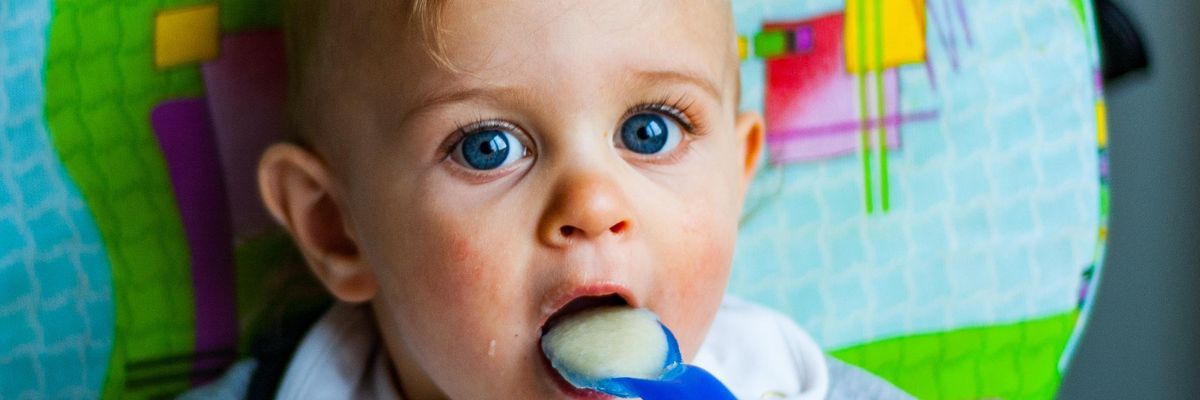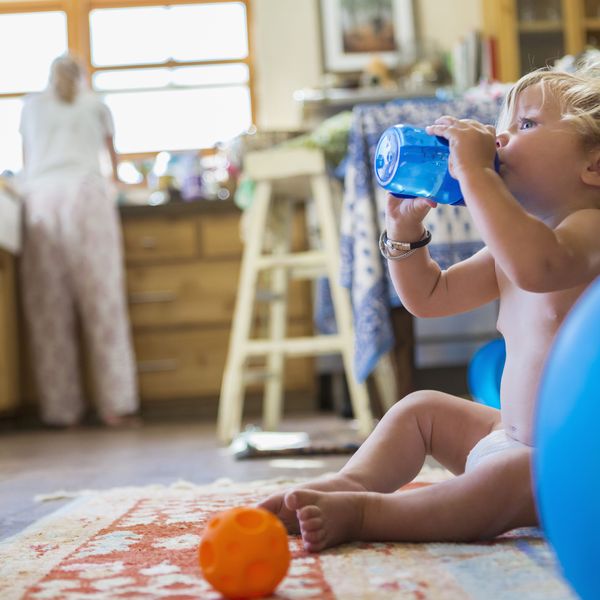
"Human exposure to microplastics is a health concern," said Kurunthachalam Kannan, lead author of a new study.
Baby Poop Has Ten Times More Microplastic in It Than Adult Poop: Study
"The future is going to wonder what on earth we thought we were doing with plastic."
Infants have an average of 10 times the concentration of a type of microplastic in their poop than adults, a pilot study released Wednesday found.
The research, published in the journal Environmental Science and Technology Letters, follows previous studies reflecting the ubiquity of microplastics--small fibers less than 5 mm in size originating from everyday objects like plastic bottles and polyester clothing and that end up in the planet's waterways and human guts.
"Human exposure to microplastics is a health concern," said lead author Kurunthachalam Kannan, a professor at the NYU Grossman School of Medicine's Department of Pediatrics.
Researchers focused on two types of common microplastics--polyethylene terephthalate (PET) and polycarbonate (PC)--and measured feces from six infants and 10 adults. They also looked at three samples of newborns' first waste, which is known as meconium. All were from New York state, and they were all found to have at least one kind of microplastic.
PC levels, the researchers found, were similar between the infant and adult groups. PET concentrations, however, revealed a stark difference, with those in infants' feces found to have levels more than 10 times higher on average.
"Our study suggests that infants are exposed to higher levels of MPs than adults," the scientists wrote.
Researchers suggested the higher concentrations could be a result of products they commonly use like teethers and bottles but said larger studies should be done.
"We need to make efforts to reduce exposure in children," Kannan said. "Children's products should be made free of plastics."
Responding to the study, Natalie Bennett, a former Green Party leader in the U.K., tweeted, "The future is going to wonder what on earth we thought we were doing with plastic."
An Urgent Message From Our Co-Founder
Dear Common Dreams reader, The U.S. is on a fast track to authoritarianism like nothing I've ever seen. Meanwhile, corporate news outlets are utterly capitulating to Trump, twisting their coverage to avoid drawing his ire while lining up to stuff cash in his pockets. That's why I believe that Common Dreams is doing the best and most consequential reporting that we've ever done. Our small but mighty team is a progressive reporting powerhouse, covering the news every day that the corporate media never will. Our mission has always been simple: To inform. To inspire. And to ignite change for the common good. Now here's the key piece that I want all our readers to understand: None of this would be possible without your financial support. That's not just some fundraising cliche. It's the absolute and literal truth. We don't accept corporate advertising and never will. We don't have a paywall because we don't think people should be blocked from critical news based on their ability to pay. Everything we do is funded by the donations of readers like you. Will you donate now to help power the nonprofit, independent reporting of Common Dreams? Thank you for being a vital member of our community. Together, we can keep independent journalism alive when it’s needed most. - Craig Brown, Co-founder |
Infants have an average of 10 times the concentration of a type of microplastic in their poop than adults, a pilot study released Wednesday found.
The research, published in the journal Environmental Science and Technology Letters, follows previous studies reflecting the ubiquity of microplastics--small fibers less than 5 mm in size originating from everyday objects like plastic bottles and polyester clothing and that end up in the planet's waterways and human guts.
"Human exposure to microplastics is a health concern," said lead author Kurunthachalam Kannan, a professor at the NYU Grossman School of Medicine's Department of Pediatrics.
Researchers focused on two types of common microplastics--polyethylene terephthalate (PET) and polycarbonate (PC)--and measured feces from six infants and 10 adults. They also looked at three samples of newborns' first waste, which is known as meconium. All were from New York state, and they were all found to have at least one kind of microplastic.
PC levels, the researchers found, were similar between the infant and adult groups. PET concentrations, however, revealed a stark difference, with those in infants' feces found to have levels more than 10 times higher on average.
"Our study suggests that infants are exposed to higher levels of MPs than adults," the scientists wrote.
Researchers suggested the higher concentrations could be a result of products they commonly use like teethers and bottles but said larger studies should be done.
"We need to make efforts to reduce exposure in children," Kannan said. "Children's products should be made free of plastics."
Responding to the study, Natalie Bennett, a former Green Party leader in the U.K., tweeted, "The future is going to wonder what on earth we thought we were doing with plastic."
Infants have an average of 10 times the concentration of a type of microplastic in their poop than adults, a pilot study released Wednesday found.
The research, published in the journal Environmental Science and Technology Letters, follows previous studies reflecting the ubiquity of microplastics--small fibers less than 5 mm in size originating from everyday objects like plastic bottles and polyester clothing and that end up in the planet's waterways and human guts.
"Human exposure to microplastics is a health concern," said lead author Kurunthachalam Kannan, a professor at the NYU Grossman School of Medicine's Department of Pediatrics.
Researchers focused on two types of common microplastics--polyethylene terephthalate (PET) and polycarbonate (PC)--and measured feces from six infants and 10 adults. They also looked at three samples of newborns' first waste, which is known as meconium. All were from New York state, and they were all found to have at least one kind of microplastic.
PC levels, the researchers found, were similar between the infant and adult groups. PET concentrations, however, revealed a stark difference, with those in infants' feces found to have levels more than 10 times higher on average.
"Our study suggests that infants are exposed to higher levels of MPs than adults," the scientists wrote.
Researchers suggested the higher concentrations could be a result of products they commonly use like teethers and bottles but said larger studies should be done.
"We need to make efforts to reduce exposure in children," Kannan said. "Children's products should be made free of plastics."
Responding to the study, Natalie Bennett, a former Green Party leader in the U.K., tweeted, "The future is going to wonder what on earth we thought we were doing with plastic."

